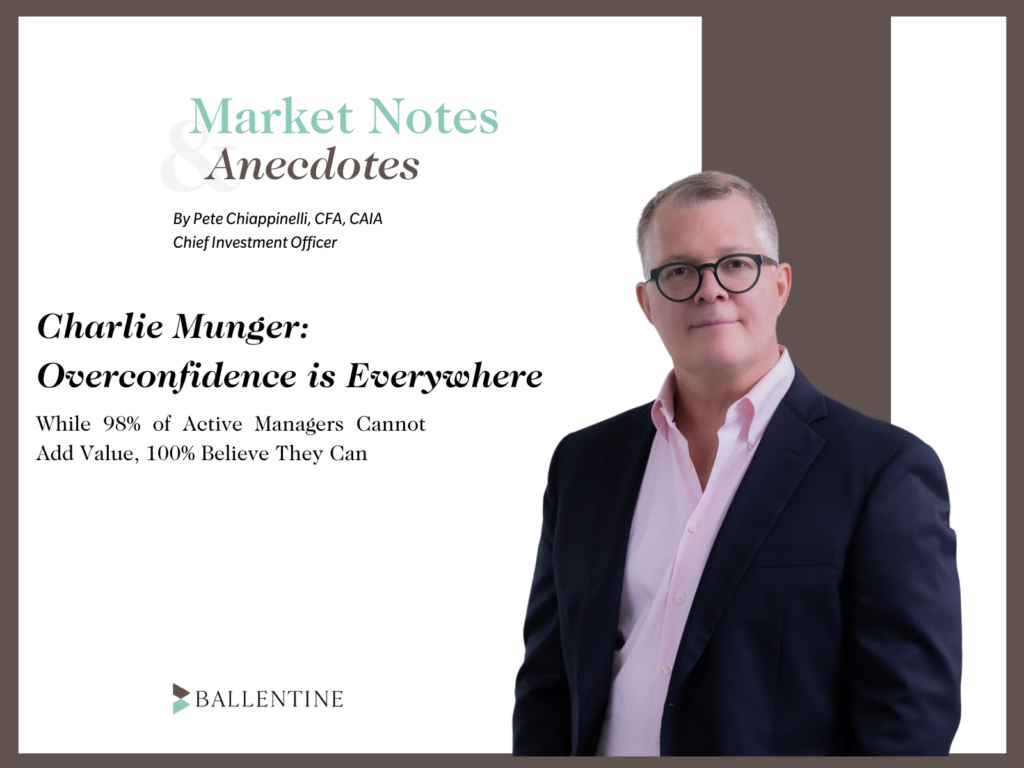For those that follow the financial news, you no doubt heard about last week’s passing of Charlie Munger, Warren Buffett’s friend and investment partner at Berkshire Hathaway for almost sixty years. Financial websites, blogs, podcasts, LinkedIn, and other social media are jam-packed with remembrances, all sharing quotes and anecdotes from Charlie’s life, and all are full of witty, pithy, and biting commentary.
There’s no need to reprint any of those gems here, but I do feel compelled to share that three weeks before he died, Charlie sat down with a reporter from The Wall Street Journal. After many hours, the reporter had one last burning question that went basically like this: “Charlie, you’ve spoken about the importance of psychology in investing and the role of biases. Is there a cognitive bias that you think is particularly significant in the markets today?”
Charlie paused. And then responded. He explained that there are all sorts of cognitive biases and bad behaviors that significantly impair our investment abilities – recency bias, confirmation bias, and many others. But the most pervasive and pernicious was “overconfidence, the tendency to overrate one’s own intelligence and skill.” Fascinating.
I mention this story because that very week, Standard & Poor’s released a unique and sobering study on active management. It was the first time ever that the firm looked at the past track records of active managers vs. passive indices on an after-tax basis. For twenty years, the research firm has been publishing reports on the performance of active managers across the world on a pre-tax basis. The report that came out in November was their first on after-tax performance.
Taxes matter. First, most of the investable assets – we estimate 90% to 95% – for our Family Office clients are taxable. Further, these families are taxed at the highest Federal marginal tax rate. Furthermore, many of our clients live in high-tax states such as New York, New Jersey, Massachusetts, California, and others. Below is a small diagram that we share with our clients in Massachusetts, for example, to highlight the magnitude of what they’re paying when they receive dividends, income, or when they realize short and long-term gains. These tax rates, as high as they are – over 53% for short-term capital gains – could actually move higher when the tax cuts of 2017 eventually sunset.

This study on after-tax performance, then, has significant meaning for our clients. And to the point above, it also speaks to Charlie Munger’s observation about overconfidence. See the chart below. It shows the success rate of active managers over various time horizons:
5, 10, 15, and 20 years. Basically, 98% of active managers fail to add any value once fees and taxes are taken into account. The final sentence of the report was stark in its conclusion: The results of this scorecard highlight that, at least in broad U.S. equities, and at least over the last 20 years, taxes would have made a considerable impact on the average returns of actively managed funds, and that the task of selecting an active fund that outperformed after tax was almost (if not completely) impossible.

Now, given the dismal odds of success, does this inconvenient data stop active managers from showing up to work each day, thinking they’ve got a chance? No. Does this inconvenient data stop the active management industry from creating dozens of new products each year hoping to achieve the seemingly impossible? No. Is this a con job of epic proportions? Probably not. These active managers are genuinely confident they can add value despite overwhelming evidence to the contrary. But it is, in the words of the late Charlie Munger, further proof of the most pervasive and pernicious cognitive bias in the active management industry.
Overconfidence.
About Pete Chiappinelli, CFA, CAIA, Chief Investment Officer
Pete is Chief Investment Officer at the firm. He is focused primarily on Asset Allocation in setting strategic direction for client portfolios.
This report is the confidential work product of Ballentine Partners. Unauthorized distribution of this material is strictly prohibited. The information in this report is deemed to be reliable. Some of the conclusions in this report are intended to be generalizations. The specific circumstances of an individual’s situation may require advice that is different from that reflected in this report. Furthermore, the advice reflected in this report is based on our opinion, and our opinion may change as new information becomes available. Nothing in this presentation should be construed as an offer to sell or a solicitation of an offer to buy any securities. You should read the prospectus or offering memo before making any investment. You are solely responsible for any decision to invest in a private offering. The investment recommendations contained in this document may not prove to be profitable, and the actual performance of any investment may not be as favorable as the expectations that are expressed in this document. There is no guarantee that the past performance of any investment will continue in the future.




